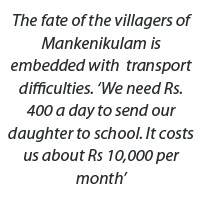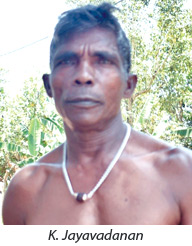
(Continued from last week)
The education officer of the Kalkuda Zonal Education Office, K. Jayavadanan, claims that although there are about 15 officers in charge of various subjects attached to the Divisional Secretariat for the upliftment of Madurankenikulam villagers, they have not yet been able to show any progress in the village.
 He said that there is no participation or contribution by the parents to the education of their children. “The parents of Madurankenikulam village do not allow their children to progress as a result.” He intends to address this issue by conducting motivational programs for parents on how to raise children and how to change their lives in accordance with changes in the modern world.
He said that there is no participation or contribution by the parents to the education of their children. “The parents of Madurankenikulam village do not allow their children to progress as a result.” He intends to address this issue by conducting motivational programs for parents on how to raise children and how to change their lives in accordance with changes in the modern world.
Forty-year-old Sellaiya Annakumar, a father of two, disputes any idea that parents are to blame. He would prefer his children to be educated and is unhappy that their education has been disrupted. “Teachers travel to school from distant places. On rainy days they cannot enter the village, it is full of water and there is flooding. Children from the village cannot even go to school. The lake continues to overflow.”
While Jayavadanan claims parents are reluctant to send children out of the village even for vocational education, Annakumar points out that his son, who is due to sit for the GCE O/L examination this year, will have no opportunity to continue his studies nearby after that, and that the family does not have the means to send him to study further away. With a heavy heart Sellaiya is now preparing to send his children to work as laborers.
Labour market
Education up to the GCE Advanced Level is considered a basic qualification for most jobs in the present labour market in Sri Lanka. However, all children in Madurankenikulam have to complete their schooling at GCE Ordinary Level.
If a student has a desire to pursue higher studies, there are two options: either the child has to walk 13 km on a very difficult remote road and then another 20 km on a motorable road to reach Vakarai, where there are more facilities; or they have to travel about 15 kms to Panchene, where options are more limited.
 Sinnathambi Panchathiram’s daughter is the only student from Mankenikulam to pursue Advanced Level classes. She studied at the village school up to O/L but since she did not get through her O/L examination her father arranged for her to be transferred to Mankeni School. After passing the GCE O/L in her new school, she has managed to get admission to a school in Panchene for her Advanced Level, supported by the keen desire of her parents.
Sinnathambi Panchathiram’s daughter is the only student from Mankenikulam to pursue Advanced Level classes. She studied at the village school up to O/L but since she did not get through her O/L examination her father arranged for her to be transferred to Mankeni School. After passing the GCE O/L in her new school, she has managed to get admission to a school in Panchene for her Advanced Level, supported by the keen desire of her parents.
Transport problems
Her father Nallathambi Panchathiram has taken sole responsibility of providing his daughter protection from a terrain known for wild elephant attacks by taking her to the main road and bringing her back daily. “We have to leave home by 5.00 am to catch the 6.30 am. We requested a CTB bus to the village, but they say that buses can’t run on this road because of the dust, he says.
The fate of the villagers of Mankenikulam is embedded with transport difficulties.
“We need Rs. 400 a day to send our daughter to school. It costs us about Rs 10,000 per month,” Panchathiram moans.
The leader of the coastal Adivasi community in the Batticaloa district, Velayudham is also a resident of Madurankenikulam, and he has concerns about the state of education in the area too.
He has met the Secretary of the Education Office and requested the provision of teachers for all subjects, but the shortage has not been resolved yet. Velayudham emphasized that providing permanent appointments to Madurankenikulam School instead of temporary teachers would be a positive solution.
I contacted the Ministry of Education to speak to the two Additional Secretaries (for School Affairs and Education Quality Development) but I was told that an official statement could not be provided since both officials had retired and their replacements have not been appointed.
However, an official at the Teachers’ Institutions Branch told me that the Ministry of Education acknowledged there was a shortage of teachers in provincial schools and that two batches to be released from teacher training colleges will be assigned only to rural areas to mitigate this problem.
The official suggested that Madurankenikulam school could make a formal request for teachers from the province to fill the vacancies.
Back at the Kalkuda Zonal Education Office, K. Jayavadanan says he hopes to appoint a new principal to the school and, with teachers’ quarters available on site, he would like to encourage new teachers to come and stay in those quarters, rather than commute, in order to fill gaps in several compulsory subjects such as Mathematics, Science and English in Madurankenikulam.
Only a dream
As I left the village to return to Colombo, my route took me past the paddy fields around the village of Madurankenikulam which are owned by wealthy businessmen living in the towns. I was reminded that these fields are where the youth of Maduranikikulam is likely to end up.
The words of 18-year-old Sathiskaran came back to me: “We would like to be employed in another vocation but we don’t get other work. There were ten students in my class at school and all ten are now working as labourers.”
Back in the city, I reflected on what I’d seen and heard. What does the future hold for the young people I’d met? Obtaining University admission is only a dream due to the prevailing educational complexities and issues. It is also near impossible to enter government service or obtain reasonable job opportunities. And why should living in a small community mean you miss out on a proper education?
Whatever the causes of the problems – and I had heard many of them (a shortage of teachers, the local infrastructure and the attitudes of parents), these factors have combined to thwart the hopes and dreams of young people in one of Sri Lanka’s most ancient communities. I had also heard about a handful of initiatives (motivational programs for parents, more teachers for rural communities, a possible new school principal) but unless concerted action is taken, this community - like many very remote villages in Sri Lanka - faces an endless cycle of poverty.
